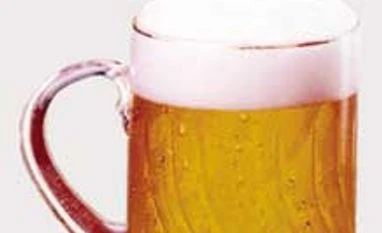Huge lines of fans buying beer inside stadiums before returning home with stacks of empty souvenir cups in their hands has been a common sight at World Cup games.
A top FIFA official expressed concern at the amount of drinking during the month-long tournament, though it was football's world governing body that forced Brazil to change its laws to allow beer sales at stadiums.
Despite the concerns, beer is expected to continue to flow unimpeded during the two semi-final games, Brazil-Germany on Tuesday and Argentina-Netherlands on Wednesday.
In the corridors of the 12 World Cup arenas, fans lined up to buy US-made Budweiser or the local Brahma brand, both owned by Belgian-Brazilian giant Anheuser-Busch InBev, a major tournament sponsor.
Many fans have streamed out of stadiums with handfuls of the 473-milliliter (16-fluid ounce) commemorative cups in their hands. They paid 13 reals (USD 6) for a Budweiser, or 10 reals (USD 4.50) for a Brahma, and the cups have become hot items for sale online.
But AFP reporters saw some heated arguments, including a brawl, during two games at Rio de Janeiro's Maracana Stadium involving fans who had apparently consumed alcohol.
At the Uruguay-Colombia last-16 game on June 28, several Brazilian fans traded blows with Uruguayans in the stadium's corridor.
The fight began after an apparently inebriated Brazilian man shouted at the face of a Uruguayan woman to mock her team's defeat, which made her drop her beer, prompting a countryman to come to her defense.
After the France-Germany quarter-final last Friday, security guards had to get between two men wearing jerseys of rival Sao Paulo football clubs in the corridor of the Maracana.
The man in the Corinthians shirt, holding around eight empty cups in one hand, shouted "come here" at the other one, but guards were able to keep them separated.
During the game, several security guards took positions between fans screaming at each other.
Some Brazilians were glad they could drink during World Cup games but they backed the prohibition during domestic league games, saying local fans can get violent.
A top FIFA official expressed concern at the amount of drinking during the month-long tournament, though it was football's world governing body that forced Brazil to change its laws to allow beer sales at stadiums.
Despite the concerns, beer is expected to continue to flow unimpeded during the two semi-final games, Brazil-Germany on Tuesday and Argentina-Netherlands on Wednesday.
Also Read
Brazil outlawed alcohol at games in 2003 to curb fan violence, but it had to pass a special law authorizing booze at the World Cup as part of its agreement to host it.
In the corridors of the 12 World Cup arenas, fans lined up to buy US-made Budweiser or the local Brahma brand, both owned by Belgian-Brazilian giant Anheuser-Busch InBev, a major tournament sponsor.
Many fans have streamed out of stadiums with handfuls of the 473-milliliter (16-fluid ounce) commemorative cups in their hands. They paid 13 reals (USD 6) for a Budweiser, or 10 reals (USD 4.50) for a Brahma, and the cups have become hot items for sale online.
But AFP reporters saw some heated arguments, including a brawl, during two games at Rio de Janeiro's Maracana Stadium involving fans who had apparently consumed alcohol.
At the Uruguay-Colombia last-16 game on June 28, several Brazilian fans traded blows with Uruguayans in the stadium's corridor.
The fight began after an apparently inebriated Brazilian man shouted at the face of a Uruguayan woman to mock her team's defeat, which made her drop her beer, prompting a countryman to come to her defense.
After the France-Germany quarter-final last Friday, security guards had to get between two men wearing jerseys of rival Sao Paulo football clubs in the corridor of the Maracana.
The man in the Corinthians shirt, holding around eight empty cups in one hand, shouted "come here" at the other one, but guards were able to keep them separated.
During the game, several security guards took positions between fans screaming at each other.
Some Brazilians were glad they could drink during World Cup games but they backed the prohibition during domestic league games, saying local fans can get violent.
)